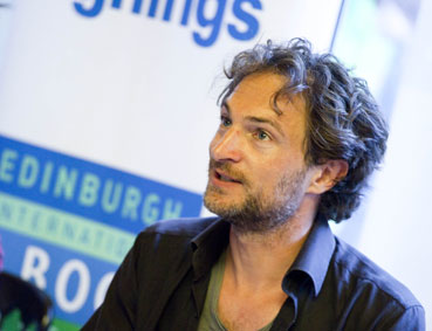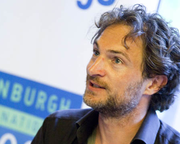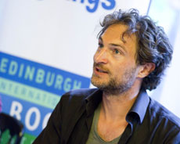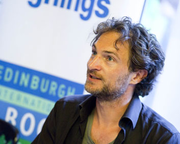Archipelago
By Marcus Sedgwick
We have commissioned a new piece of writing from fifty leading authors on the theme of 'Elsewhere' - read on for Marcus Sedgwick's contribution.
In the small cluster of islands that lie between North Uist and Harris is one, just 500 metres at its widest point, less than three times that in length. As far as anyone has found out, there was never a Gaelic name for the island; when Victorian tourists began to explore the area, it was given, unofficially, the only name it’s ever had – Elsewhere. Elsewhere is shaped like an exclamation mark; a narrow isthmus connects the dot at the bottom to the bulk of the island, the permanent population of which is one. The crofter who lives there used to rent an old croft house to holidaymakers, outward bound groups and the like, but not any more. In August 1995 a teenage boy went missing while on a holiday for underprivileged city children. No one has stayed on the island since. This is a fictionalised account of what happened that summer.
Nick shooes the teenagers into the kitchen. Naomi finishes up with Aonghas, the apparently ancient crofter who’s rented the old croft house for a song. The charity they work for has a tight budget and it’s cost a fortune to get the eight of them to the island; a cheap house was just what they needed.
Aonghas, while not exactly the epitome of warmth, is a reasonable enough man to deal with, and the rent, though small, is probably enough of an incentive to him to make visitors feel welcome and comfortable, though the place is far from luxurious, a fact not lost on the kids.
The six of them, the three girls, the three boys, stand staring at the floor rather than each other. It’s late, they’re tired. The girls are playing with a couple of cats that seem to come with the house. The boys sit at the large kitchen table, their bags still around them on the floor.
Nick looks at the children, not for the first time wondering if his work is as valuable as he likes to think it is. He and Naomi have both been at the charity for five years, long enough for the zeal to start waning, though certainly not long enough for them to have become embittered.
But trips like this, that take forever to organise, to bring just six young people all the way from London to this remote place, and…for what? He knows what it says on the charity’s mission statement, and if provoked would get angry defending the work they did, but really, would it ‘fundamentally change’ the lives of the kids to spend a week on a remote Scottish island? Would it ‘empower’ them? Would it ‘develop’ them? Or would it just bore them to death?
As Naomi joins them, she shuts the door behind her with a sigh.
‘I’m bushed. Tea?’
Niall, as usual, is the first to talk.
‘Maybe it’s like the kangaroo,’ he says, in that quick, clipped way he has. The oldest of the boys, fourteen, yet probably the least mature. His life is lived through books and films, and any understanding he has of the serious things in life is derived from these.
Becca is not too tired to enjoy one of Niall’s escapades.
‘The kangaroo?’ she laughs, leaving the cats.
‘Yes,’ Niall explains. ‘The island. It doesn’t have a name, that’s what Nick said, isn’t it, Nick? Not a Gaelic name, just Elsewhere, which is a pretty stupid name for any place, but maybe it’s like the kangaroo. You know, when white people settled in Australia and they saw this big thing bouncing about, like a bunny, but twenty times as big, and they asked a local, you know, an aborigine, and said, “what’s that?” and the aborigine said, “kangaroo”, which just means “I don’t know”.’
Becca laughs again.
‘That’s not true.’
‘It is,’ Niall says, not at all offended. ‘Nick, that’s true isn’t it? So maybe it’s the same here. Maybe someone came to the mainland near here and said, “What’s that place called?” and the local said “Oh, that’s not here. That’s just somewhere else. Elsewhere.” ’
Nick smiles.
‘An interesting theory,’ he says. No one else looks interested. ‘But do you know what is true? The island doesn’t appear on many maps.’
Dylan and even quiet little Robbie look up now.
‘Are you going to tell us a spooky story?’ smiles Naomi. ‘Maybe tomorrow night, when we’re not so tired.’
Nick holds up a hand, shrugs.
‘No ghost story. It’s true. There was some old fuss about this place. Private land, some ancestors of Aonghas’ maybe, went to a lot of trouble to stop the old Ordnance Survey from surveying. Said it was modern nonsense, they could see one end of the island from the other, so why did they need to draw it?’
‘I don’t see what cats are for.’
Niall again. No one is surprised by this kind of thing now, not after three days from London to get here in a small minibus and a boat from the mainland.
‘What’s that, Niall?’
‘Dogs I get,’ he says. ‘I can see the point of dogs. You can have a conversation with a dog.’
‘You could have a conversation with a wall,’ says Becca.
‘Yes, well, possibly I could, but I would prefer to talk to a wall than to a cat. They just sit there, looking at you. Then they want food. You feed them. You wait a few hours, during which they look at you again. Or sleep. I mean, what’s the point?’
Ruby, the cool girl, shakes her head.
‘You are seriously weird, Niall.’
‘Hey,’ says Nick, warningly, but Niall, as usual, either doesn’t hear or doesn’t care.
‘I mean, look at that one.’
He nods at the black cat, which had hopped up onto the shelf above the range, where it sat, glaring at them.
‘I mean, that is, at best, one very sulky beast and, at worst, some cohort of the devil!’
‘What’s a cohort?’ asks Dylan.
‘Associate. Business partner. Partner in crime. Friend. Chum.’ says Nick. ‘That kind of thing.’
‘So why can’t you just say friend, Niall?’ asks Dylan.
‘Not as much fun to say that. Cohort is more fun. Cohort. Try it.’
Dylan does.
‘Cohort,’ he says, thoughtfully. He smiles. ‘Yeah you’re right. Cohort. Cohort. Cohort, cohort, cohort.’
Then they’re all saying it, even Ruby, and Nick and Naomi exchange a weary but happy glance, and send them all to unpack.
After food, the boys one by one slope off to bed, then the girls decide to go at the same time, and Nick and Naomi sit by the open fire, trying to get the coal to burn a bit better.
‘I think this might be all right,’ Nick says.
‘Wait till day three before you say that. No TV, no video games. Half of them don’t read. The island is smaller than most shopping centres, and with much less to do unless you like sheep. And as you well know these are all kids with serious problems.’
‘Is it actually August here, by the way? It’s freezing.’ He pokes the fire again. ‘I know they have problems, but we’ve coped with worse. Remember Portugal?’
There’s a slight pause, and Nick realises she might be thinking about what else happened in Portugal, besides them empowering some really mixed-up kids. Or rather, what almost happened between them.
‘Okay, so let’s just say that my jury is out. Let’s see how tomorrow goes. This is going to stretch even our amazing skills.’
‘We’ll break them in gently,’ Nick says. ‘Route march round the perimeter of the island, build a fort from sheep’s droppings before lunch. So forth.’
‘Deal,’ said Naomi, smiling. ‘But take it easy on them, yes? I’m not sure how much of an outdoors man Niall is, for example.’
Nick feigns outrage.
‘What are you suggesting?’
‘Well, what I’m suggesting,’ Naomi says, ‘is that the boy is completely gay. He just doesn’t know it yet.’
‘How very inclusive of you. Just because he is precise and tidy and funny and…’
‘It’s not a criticism to say he’s gay,’ Naomi says. ‘You’re the one with the issues if you think it’s a criticism.’
‘You win. What about the others? Would you like to stereotype them too, while you’re about it?’
‘Fine. Ruby, cool chick. Missing her boyfriend. Very serious thing at fourteen you know. Clary, hippy parents. Bet you anything. Becca, arty parents. Too bright for her own good.’
‘That’s a really…’
‘I mean it. I know the type. Niall, well, you have my views. Dylan, funny, the joker, but I think he’s pretty practical too. Did you see how he helped with the bags? I didn’t even have to ask and there he was. Robbie, well, Robbie… Robbie’s a bit harder. He’s so quiet. I mean SO quiet.’
Nick is suddenly thoughtful. Quiet.
‘Well, given the levels of abuse he’s had, maybe that’s hardly surprising. If we can even get a smile out of him, I’ll call this week a success.’
‘Agreed. They’re the usual odd bunch, aren’t they? Proving once again that dysfunctionality comes in all shapes and sizes. You’d be hard pressed to guess there was anything wrong with Becca, for example. Three suicide attempts at thirteen. That’s pretty hardcore.’
The two of them fall silent.
The fire dies. They are cold and they move closer to each other. Nick puts an arm round Naomi.
‘It’s not that cold,’ she says.
He takes his arm away again, and they turn in.
The following day is bright, sunny, and warm.
The eight stand outside the croft house, staring open-mouthed at the endless sea in front of them.
‘We are but a speck,’ says Niall, very quietly, after a very long time.
No one disagrees. They all understand him for once. The island, their island for the week, is just a sliver of earth floating in a universe of water.
‘Is that Shakespeare, Niall?’ asks Naomi.
The boy grins.
‘Glad you think so. Pure Niall Marshall.’
They stand a while longer.
‘Right,’ says Nick, eventually, but brightly. ‘Let’s explore.’
They do, with varying degrees of enthusiasm.
Niall hangs out with the ‘grown-ups’, as he likes to call Nick and Naomi. Dylan and Robbie and Becca come along next. Ruby and Clary are the most reluctant, dragging along at the back, though not unhappily. They are talking about boys, and by boys they do not mean Niall or Dylan or Robbie.
They spend an hour or two on the shoreline, not doing very much, not feeling the need to do very much, and just before they decide to head for home, they see the dot of the exclamation mark, at the far south of the island. A narrow strip of shingle is all that connects the dot to the ‘mainland’ and it’s easy to see that the shingle would disappear during any half-decent storm.
‘Wow,’ says Dylan, ‘look at that.’
He points up onto the hill of the dot, where he’s seen what no one else has yet, an ancient circle of stones, long craggy fingers pointing at the sky.
‘Can we go there?’ he asks Nick.
Nick nods.
‘Absolutely. After lunch. Come on.’
They return to the dot, crossing the narrow shingle isthmus in single file, and spend a long time walking round the eight stones, peering at them, touching them, leaning against them, hiding behind them.
It’s about half an hour before Clary, of all people, says, ‘You know, this would be a really cool place to camp. The night. Nick, you did say we could camp out one night.’
‘I said maybe we could. We have no tents. It would have to be a still night.’
‘But we could have a big campfire and cook food on it and bring our sleeping bags.’
Clary’s enthusiasm for camping is surprising and infectious.
Everyone agrees it sounds fun, even Ruby.
As they make their way back to the house, Naomi winks at Nick.
‘See. Hippy parents. That’s another fiver you owe me.’
Nick points out they hadn’t actually made a bet.
‘Well, I bet you a fiver they don’t all last the night.’
‘What, you think we’re actually going to do it?’
‘Sure. Why not? We should encourage any initiative, right?’
Nick smiles.
‘Fair enough. The first still night, then.’
A still night does not come to begin with.
There are two nights that are anything but calm. On the first, Becca wakes up the whole house with a screaming fit in the small hours.
She will talk to no one, explain nothing, and in the end Naomi sits with her downstairs on the sofa till she finally falls asleep as the sun starts to edge over the mountains away on the mainland.
The next night, Dylan is violently sick; it turns out he’s allergic to red pepper, and just forgot to tell anyone. The soup was tomato and peppers.
So, on the fourth night after their arrival, they venture down to the dot. They have spent all day preparing. There are no trees on the island, but they’ve found a pile of smashed-up pallets in a shed that they can use as firewood for a campfire. Nick, Dylan, Robbie and Becca have spent all afternoon carrying the wood down, in four or five trips. Naomi, Clary, Ruby and Niall have been making food that will be easy to cook on the campfire: potatoes in tinfoil, sausages and beans.
‘That’s what I like about camp cooking,’ says Niall, ‘no vegetables.’
Naomi wonders exactly how much camping he’s ever done. She knows about his life, his problems. How he can pretend to be so breezy about things brings a lump to her throat. But then, that’s often what these kids are like. The desire to live eventually breaks through the hard stuff. Sometimes.
Now, they make their way down to the stone circle, carrying their sleeping bags.
The sun is starting to dip into the sea; it’s a perfectly calm and still evening.
They stand for a moment, before Nick announces that they should get the fire going. They do. It’s easy – the wood is old and has been sitting in the shed behind the house for who knows how long.
Soon they are toasting their toes, eating from tins, waiting for the potatoes to be done.
It’s Niall who says, ‘Eight.’
‘What now?’ laughs Becca.
‘Eight stones! Eight of us. One each. That’s good, because we don’t have to squabble.’
‘Squabble?’
‘Well, supposing there were nine of us. We’d have to play musical chairs.’
‘Let’s all choose a stone,’ says Clary.
When the potatoes are ready, they all get one and take it back to their chosen stone.
‘Who do you suppose made this place?’ asks Robbie, so quietly that no one can believe he has spoken. No one answers, because no one knows.
The night deepens, and though it is still, it gets cold. The fire flickers.
Nick wanders over to it and stirs it, throwing some more old pallet wood on.
He returns, not to his stone, but to Naomi’s. He sits down beside her. The kids are chatting, quietly, all seeming quite calm.
‘I think I might win that fiver,’ says Nick.
Naomi laughs gently and they sit staring at the flames for a long time.
‘Is it cold enough?’ says Nick, faintly.
Naomi understands.
‘Almost,’ she says, slyly. ‘Al-most.’
They whisper to each other, heedless of other whispering, whispering in the water, a short stone’s throw from where they huddle.
‘I think it is going to be all right,’ says Naomi. ‘You were right.’
Nick smiles in the darkness.
Suddenly, like a dream descending, it is quiet.
No one speaks.
Becca shrieks. Just once, and then is still. Everyone looks at her to see what is wrong; her eyes are wide and she is pointing at Niall, or rather, just over his shoulder.
Her lips move, but no sound comes out.
Every eye turns to where she is pointing, all except Niall, who is frozen, infected by the fear on Becca’s face.
What the others see is another face, but it is not human, not exactly. In the darkness, the half-light of the fire, they can see a face that appears to hover just behind Niall. The skin of the face is dark blue, and glistens in the light. It is wet, as if it has slipped up and out of the ocean just behind them, and crawled to the circle. Its head is bald, its shoulders are naked, the rest of it is lost in shadow.
The skin is blue, the eyes are black, just empty black pits.
‘Niall,’ hisses Nick. ‘Don’t move.’
Niall raises his hand too, points at Nick.
‘There’s one behind you, too.’
And then they realise that there is one of the strange faces just behind each of them. The faces are expressionless, unreadable. They show neither hostility nor anger, fear nor kindness.
Blue skin, black eyes.
And then they slip away into the darkness, and it is only after they have retreated that Becca starts to scream.
‘It’s okay, it’s okay,’ shouts Nick, running to her, ‘they’ve gone. Whatever they were, they’ve gone.’
But Becca has seen what no one else has.
‘But so has Robbie. Robbie’s gone. He’s gone. They’ve taken him.’
All eyes turn to the stone where little quiet Robbie had sat, eating his potato.
They search for hours in the dark, and the next day too when daylight comes, until the police arrive.
They do not find him.
His empty sleeping bag lies on the ground, a mundane memorial for a troubled boy.
Copyright © 2010 Marcus Sedgwick. All rights reserved.
Supported through the Scottish Government’s Edinburgh Festivals Expo Fund.
Look, Listen & Read
Find Events
Latest News
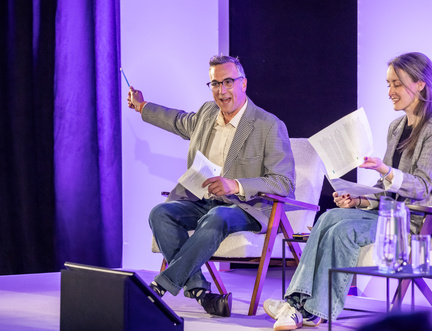 Join the Citizen Collective
Join the Citizen Collective

